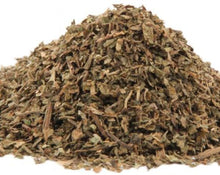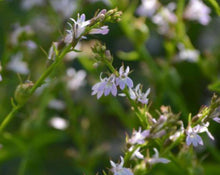Indian Tabacco great Muscle Relaxant and other health benefits
Indian Tabacco - Lobelia Inflata
Origin: United States
Used part: Leaf
Description:
Lobelia (Lobelia inflata), or Indian tobacco, is a flowering herb that is named after the Belgian botanist, Matthias de l’Obel. It was formerly used as a substance to aid in smoking cessation but has since been discontinued because of mixed results. In a broader sense, lobelia can refer to a wide variety of flowering plants, with some botanists claiming that these varieties belong to a separate family, Lobeliaceae. One of the most common and popular variety of lobelias is the Lobelia inflata variety. Other varieties of lobelia plants include both Lobelia siphilitica and Lobelia cardinalis. These varieties normally can be distinguished from the Lobelia inflata through their flowers’ different colors.
Lobelia siphilitica is the most cultivated variety of this plant and is often called the “great blue lobelia” because of its vivid blue flowers, as opposed to the pale color of Lobelia inflata. Lobelia cardinalis is also much easier to differentiate because of the distinct bright red color of its flowers. Because of its dainty flowers, lobelia plants are usually planted in the garden or in window boxes to accentuate the ambience of the surroundings. However, its beauty sometimes leads to its nutritional components being overlooked.
Health benefits:
Lobelia is used for breathing problems including asthma, bronchitis, whooping cough, and shortness of breath (apnea) in newborn infants. Some people take lobelia as a sedative to help them relax. Other people use it to increase sweating. Lobelia is applied to the skin for muscle pain, joint lumps associated with rheumatoid arthritis (rheumatic nodules), bruises, sprains, insect bites, poison ivy, and ringworm.
Good Herbal Remedy:
- Respiratory stimulant and antispasmodic: Lobelia may help the bronchial tubes relax, stimulating breathing and loosening phlegm.
- Expectorant: Lobelia decreases the viscosity and promotes the excretion of mucus produced in the respiratory system. It works by triggering the cough reflex and is said to be more effective than other expectorants. It is commonly used to ease pneumonia and bronchitis.
- Muscle relaxant: In small doses, lobelia may help constricted areas in the body relax, promoting better blood circulation. It may also aid in easing stomach cramps and other body tensions.
Directions:
Make this simple and delicious herbal tea to unwind after a stressful day, relax and rejuvenate sore muscles, or help your physical body relax for sleep.
2 parts Sage
2 part Chamomile
1 part Peppermint
1 pinch Lobelia
Combine herbs.
Steep 1 Tablespoon of blend in 8 ounces (approx. 1 standard mug full) of boiled water for 5-7 minutes. Steeping too long or too hot will cause bitterness in this blend. Keep your cup covered while the tea steeps to make sure you don’t lose any of the amazing flavor or healing properties.
Allow the tea to cool to a safe and comfortable temperature, then sip to enjoy! The relaxing effects will start to take effect within minutes and you may find yourself in a state of deep relaxation and ease long before you even finish the cup!
Note: A ‘part’ can be any volume measurement you choose. For a smaller batch, a part might be a Tablespoon. If you want a big batch to keep on hand, a part might be a cup.
Contraindications:
Even though it has a variety of health benefits when taken in moderation, lobelia may actually be poisonous when ingested in large quantities. It’s also poisonous for pets and other animals and should be removed from the vicinity where these pets reside to avoid them from being harmed.14 If you have pets, do not plant this herb in an area that’s accessible to them.
Lobelia should also be avoided when you suffer from high blood pressure and heart disease: Lobelia is a vasomotor stimulant and may cause an increase in blood pressure. This may worsen the symptoms of high blood pressure and could even cause irreversible damage. As well as in patients with tobacco sensitivity: Lobelia contains lobeline, a substance that has the same effect of nicotine in the human body. This alkaloid contains about 5 to 20 percent of nicotine’s potency.
Lobelia should not be used by people who suffer from liver or kidney disease, seizures or shortness of breath. Like other herbs and medications, lobelia should be avoided by pregnant and breastfeeding women, as it may cause adverse effects.




